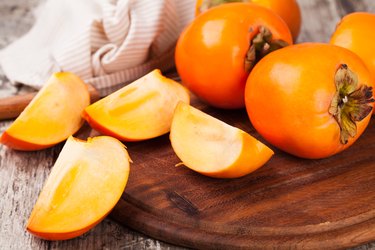
If you've never had a persimmon, it's worth giving this sweet, juicy snack a try. The Fuyu persimmon has bright orange skin and is eaten like an apple.
The fruit — which looks a bit like a tomato and can be eaten raw, dried or cooked — is packed with vitamins and minerals that can give your body a boost. Just as important, persimmons are delicious!
Video of the Day
Video of the Day
Here's a look at the calories in persimmon fruit plus all the things that make them winners in the nutrition department.
Persimmon Nutrition Facts
Like most fruits, persimmons are relatively low in calories but high in nutrition. According to the USDA, one medium Fuyu persimmon contains:
- 118 calories
- <1 g fat
- 31 g carbohydrates
- 6 g fiber
- 21 g sugar
- 1 g protein
- 14% Daily Value (DV) of vitamin C
- 15% DV of vitamin A
- 8% DV of vitamin E
- 4% DV of vitamin KI
- 26% DV of manganese
- 6% DV of potassium
- 21% DV of copper
Like other fruits, most of the calories in persimmon come from carbs.
The Health Benefits of Persimmons
Persimmon's impressive nutrient profile means that the juicy orange fruit offers plenty of health perks. Here's a look at why persimmons are good for you.
1. Meet Your Daily Fruit Goal
Only around one in 10 Americans gets the recommended daily servings of fruit, which is four servings, according to the Centers for Disease Control and Prevention (CDC). That's at least 1 ½ cups for people assigned female at birth and 2 cups for people assigned male at birth.
A medium persimmon counts as one serving, bringing your closer to this important nutritional benchmark. And eating enough fruit is linked to a reduced risk of heart disease, type 2 diabetes, some cancers and obesity, per the CDC.
2. Promote a Healthy Immune System
Persimmons help support a robust immune system. They contain vitamin C — 14 percent of your DV per fruit — which plays a key role in promoting healthy immune function, according to the National Institutes of Health.
3. Keep Your Eyes Sharp
The vitamin A in orange fruits and vegetables, including persimmons, supports healthy vision and helps your peepers produce enough moisture to stay properly lubricated, according to the American Academy of Ophthalmology.
4. Protect Your Heart
Potassium-rich foods like persimmons encourage your blood vessels to relax and help your body to excrete more sodium. Both of those things have a beneficial effect on blood pressure, and in turn, lower your stroke risk, notes the American Heart Association.
5. Keep You Regular
Fiber's a must for healthy bowel movements, and persimmons are packed with it. According to the Mayo Clinic, the nutrient makes stools softer and easier to pass, so regularly getting your fill helps prevent constipation.
6. Help Keep Your Weight in Check
Fiber also helps you eat less and stay satisfied longer, the Mayo Clinic notes. In fact, a February 2015 study published in the Annals of Internal Medicine found that eating 30 grams of fiber daily could be enough to help people lose weight.
With 6 grams of the nutrient per fruit, a single persimmon is a delicious way to get closer to your daily goal.
Persimmons might not be the most popular fruit in the produce aisle but they're definitely worth eating, both from a flavor and nutrition perspective. Next time you spot them, grab one and give it a try. Your tastebuds — and your body — will be glad for it.
Persimmon Recipes to Try
- Persimmon, Pistachio and Turnip Salad with Mustard Greens
- Holiday Gem Sweet Potato Toasts
- Bacon and Egg Salad
- U.S. Department of Agriculture, FoodData Central. (2020.) Persimmon, raw.
- Mayo Clinic. (2021.) Dietary fiber: Essential for a healthy diet.
- Harvard Health Publishing, Harvard Medical School. (2020.) Can vitamin C prevent a cold?
- Centers for Disease Control and Prevention. (2021.) Only 1 in 10 adults get enough fruits or vegetables.
- American Academy of Ophthalmology. (2020.) What is vitamin A deficiency?
- My Food Data. (2021.) Nutrition facts for Fuyu persimmon.